#gullah people
Text
I think people shouldn't be allowed to look at an African American who complains about America and tell them to leave.
Why?
We were brought here against our will. We built this shit show and contributed to the culture. We suffered at the hands of EVERYONE else who happened to be here. Certain Native American tribes included. Uh-huh. We didn't forget.
Oh, and we're still being shot due to the "They're dangerous' stereotype. We're are forever fetishized.
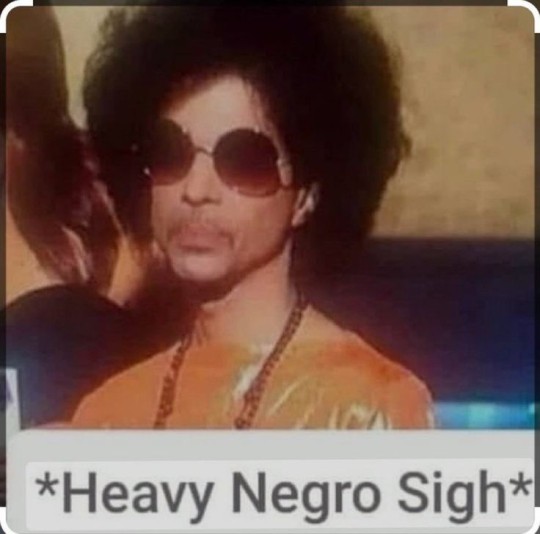
And even if we do leave the country, we're at the bottom of the barrel on this planet because we're black and AMERICAN!
Everyone legitimately dislikes us for whatever irrational reason. Whether it's because they think we're all gun happy druggies with no culture or because they think we're not well behaved and always rude. Promiscuous is what they see when they look at our women. It's despicable to me.
No matter where we go, we're gonna be treated the same, just in other places, they won't try to kill us, and it's less likely I'll turn up dead.
So no.
You don't get to tell me to leave. You can get your shit together and fix this mess you call a country and SAY THANK YOU!
#african american history#african american#african american culture#gullah geechee#black americans#black culture#black history#black people#black lives are precious#black lives matter
176 notes
·
View notes
Text
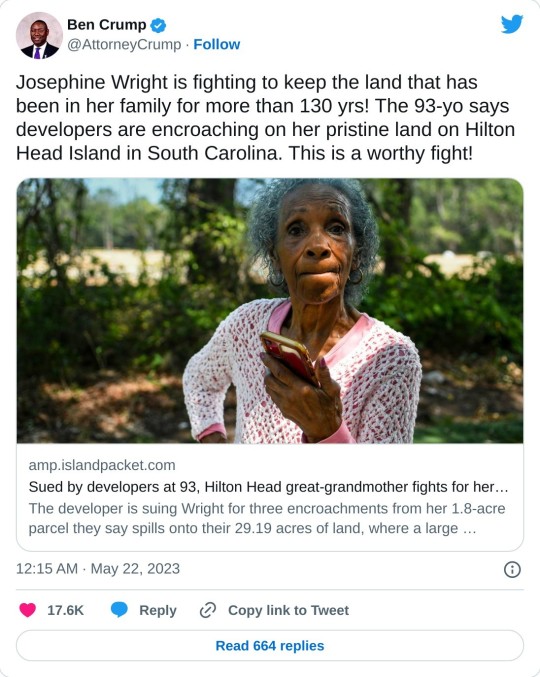
youtube
Nothing about this is right - nothing
#geechee land#south carolina#Hilton Head#Gullah People Land#93 year old Hilton Head woman facing lawsuit from developers#Josephine Wright#heritage land#family property#stolen legacy#white supremacy#white hate#Youtube
518 notes
·
View notes
Text
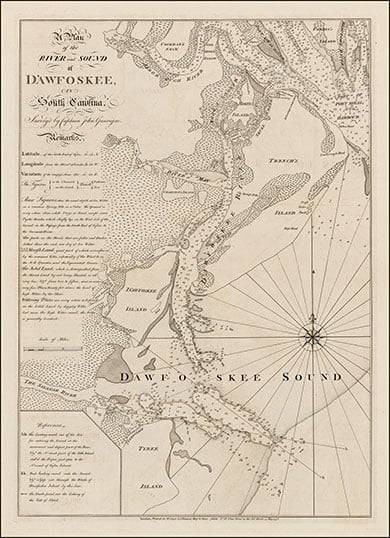
1663 Island surveyed by William Hilton, an English sea captain, sailing from Barbados in search of tropical lands on which to establish profitable English plantations.... becoming “Hilton's Headland” as it was written about in Capt. Hilton’s journal.

1698: John Bayley of Ireland took title to 16,200 acres. 24 years later his son appointed Alexander Trench, to be the first real estate agent. The Island was referred to as Trench's Island.
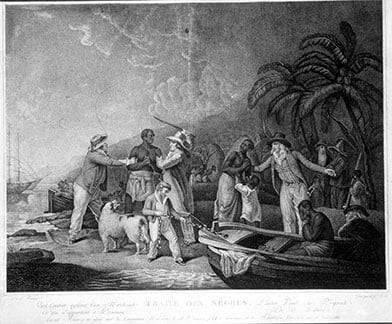
Early 1700s: Enslaved West Africans begin being brought to the Georgia and South Carolina sea islands, including Hilton Head Island, to tend the rice and cotton fields.
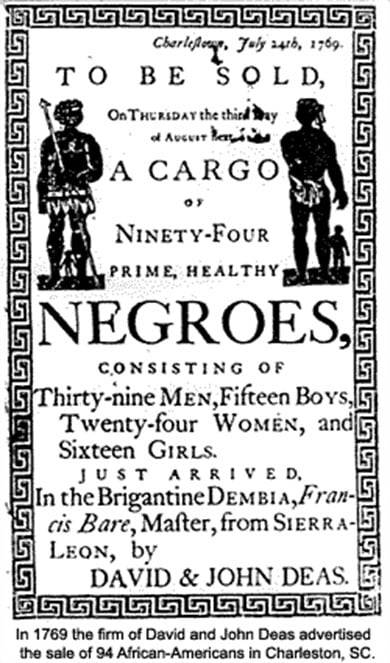
1730-39: About 20,000 enslaved Africans are brought to South Carolina
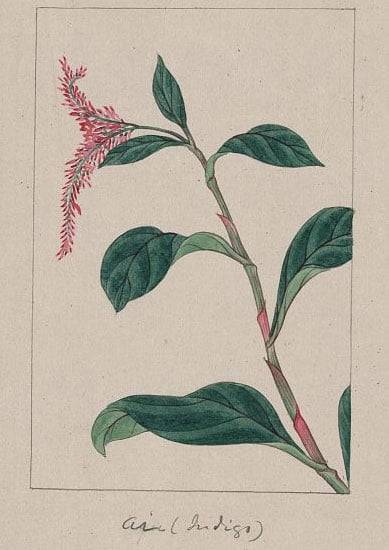
1740: Indigo introduced on the Island. Cultivated and tended by the growing population of enslaved Africans, the indigo bricks became an important export sold to the English for dye
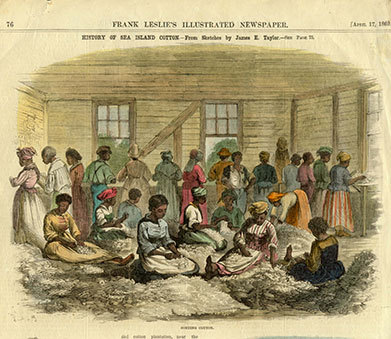
1790: The first successful crop of long-staple or Sea Island cotton is grown at Myrtle Bank Plantation, now known as Dolphin Head in Hilton Head Plantation
#south carolina#dawfoskee island#Geechee#Gullah#Sierra Leone#Enslaved Black People#plantations#hilton head#sea island cotton
6 notes
·
View notes
Text
is anyone here Seminole from the South East region of the US? i am Gullah Geechee and our people have a tied history.
for example we fought a war against white settler colonialists as allies in the Gullah Wars that took place in South Carolina and Florida (you may know the Florida half of it as the "SeminoleWars")
more here:
https://twitter.com/geecheesociali1/status/1254956622062989317
my friend wrote it. it is unfortuneatly on twitter so you would need an account.
there is not a lot of free information available on it from the Gullah pov ime.
i am curious about any shared characteristics or practices we have. i am from South Carolina and so is 3/4ths of my family, and the other 1/4 of my family is from from Florida. i don't know them too well due to deaths, but they look like me and also integrate spanish among other things. we (Gullah and Seminole) people had a settlement in (”Spanish”) Florida.
we have intermixed but idk how to feel totally because some of us were kept as slaves by the Seminole. we have mixed history, good and bad. let’s chat and build/mend a bridge :)
i've never done any DNA testing, but that's not what I am after here. I just would like to have a cultural exchange, and listen to your history of the events etc. build some bridges in respect to our those of our ancestors who built bridges too. also, my Floridian Descendent of Slavery, Gullah sounding, Spanish patois speaking, family is a little lost to me. if this is you, or you know more, i'd love to be a little less lcultually separated in that regard.
#Seminole#gullah geechee#Indigenous#Black Seminole#Seminole Wars#Florida#i get white people often claim to be indigenous but i think this is different for a lot of reasons#all links that aren't twitter go to mastodon
4 notes
·
View notes
Text
Before Juneteenth comes to a close, let's not forget to honor our ancestors, all of the American Freedmen soldiers who fought and died in the civil war(despite this country always trying to downplay the major role Black people played in the civil war) as well as the Gullah Geechee Maroon rebels (Gullah War. The longest war fought on American soil) who also fought to end slavery and whose efforts placed an even greater pressure on the American government to end slavery and thus helped spark the civil war.
This day is nothing without our ancestors. We should use it to honor their memory, their sacrifice, and courage. We should also use this day to encourage all of us to continue to fight for equality, equity, and the restoration of our people: economically, politically, academically, culturally, socially, etc.
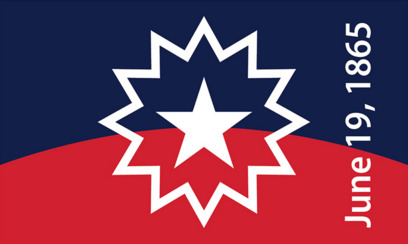
#black pride#black people#black history#juneteenth#june 19#black lives matter#equality#reparations#reparations for slavery#american history#american freedmen#gullah geechee#gullah wars#american wars#history#civil war
6 notes
·
View notes
Text
My Heavenly [MH] 1946 gullahgeecheemilitary.tech DNA Father + My [FM] 1948 quantumgullahgeechee.tech DNA Mother... Alkhemically & Genetically Engineered [MAGE] ANU 144,000 GOLDEN 9 Ether [MAGE] 2223 ALUHUM [MA] ANUNNAQI [MA] DNA LIFE CLONE of 1968 Gen X NIBIRUAN ME [MICHAEL] @ 1921 QUANTUM 2023 HARRELL 2024 TECH 2025 Apple & IBM [A.i.] LLC of ATLANTIS [L.A.] 5000
WELCOME BACK HOME IMMORTAL [HIM] U.S. MILITARY KING SOLOMON-MICHAEL HARRELL, JR.™

i.b.monk [ibm] mode [i’m] tech [IT] steelecartel.com @ quantum harrell tech llc

نالي جي نالي سان… شيطان کان ان کي ملامت ڪريو ۽ پٿر جي نالي سان اشدو هڪ لا لا لا لا لا؛ محمد الله جو رسول آهي

OMMMMM

OMMMMM

OMMMMM

OMMMMM
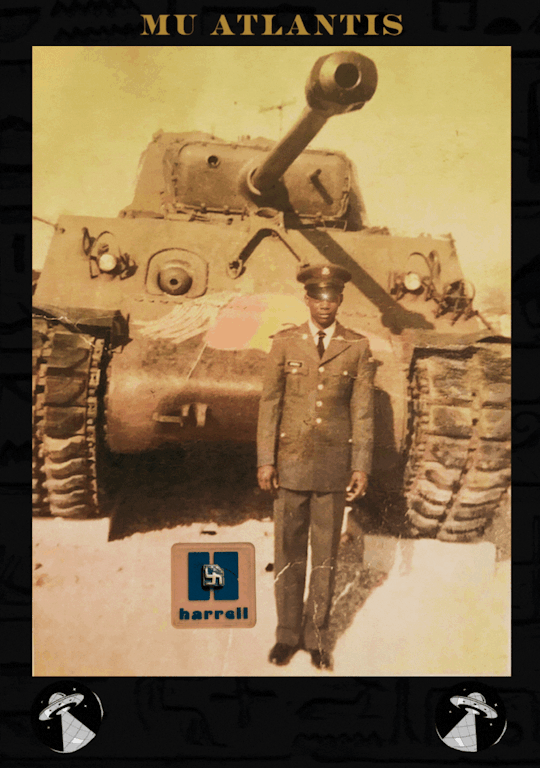
WAKE UP [WU] LOST ONES!!! WE GULLAH GEECHEEE ALREADY BEEN [GAB = GABRIEL] WON THE 2012 MAYAN MEMORY PROPHECY WAR ON FALLEN 1999 Y2K 2000-2023 9/11 AMERICA in 2001!!!
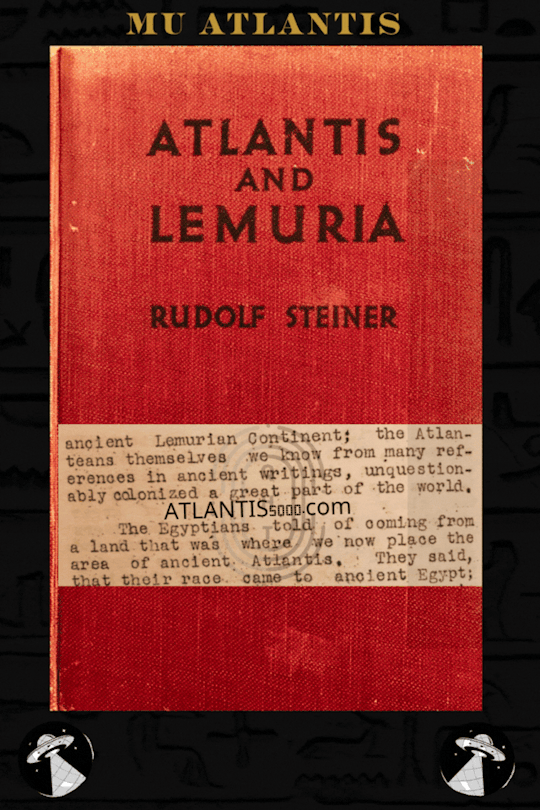
OMMMMM
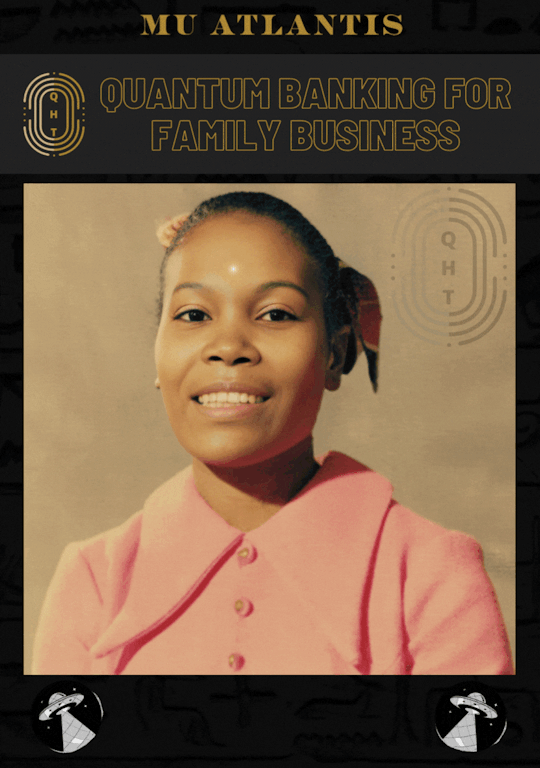
OMMMMM MOTHER [OM] STEELE HITTITE-HARRELL-HURRIAN [Shhh] MILITARY SOCIETY @ 1921 QUANTUM 2023 HARRELL 2024 TECH 2025 Apple & IBM [A.i.] LLC of ATLANTIS [L.A.] 5000

OMMMMM

OMMMMM
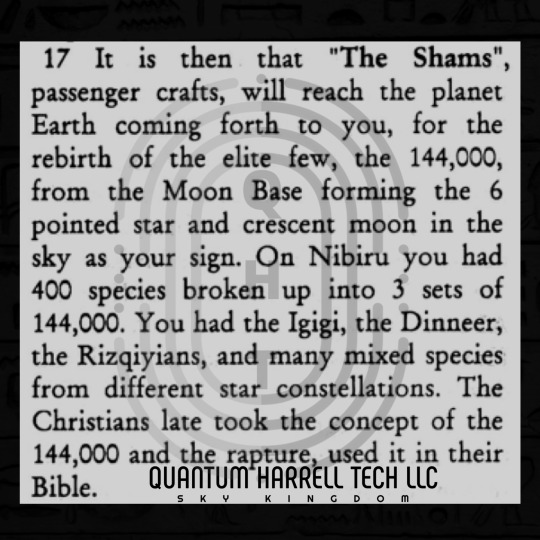
OMMMMM

OMMMMM

OMMMMM

OMMMMM

© 1968-2024 QUANTUM HARRELL TECH LLC All DotCom DNA Domain Rights Reserved.
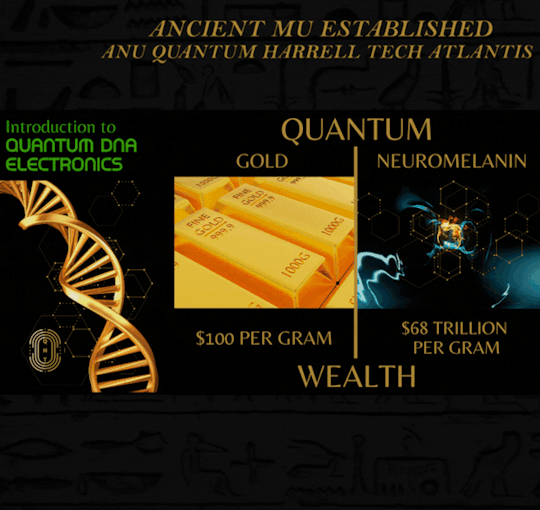
EYE MONETIZED [I'M] MY [I'M] FATHER & MOTHER'S [FM'S] GOLDEN 9 ETHER QUANTUM ELECTRONIC NEUROMELANIN DNA SIGNATURES WAYYYYYYYYYYYYYYYYYYYYYYYYYYYYYYYYYYYYYYYYYYYYY ABOVE YOUR MUNDANE 2023 PAY GRADE

© 1968-2024 QUANTUM HARRELL TECH LLC All DotCom DNA Domain Rights Reserved.

OMMMMM

MY 1921 QUANTUM 2023 HARRELL 2024 PENTAGON 2025 TECHNOCRACY FAMILY EXPENSIVE AF!!!

Shhh... ANU GOLDEN 9 ETHER [SAGE] 1968 GEN X QUANTUM HARRELL TECHNOCRACY [QHT] TOOK OVER FALLEN 1999 Y2K 2000-2023 9/11 AMERICA in 2001 [insert diabolically evil encryption laugh emoji]
#om#o michael#harrelltut#mu:13#kemet#quantumharrelltut#king tut#quantumharrelltech#u.s. michael harrell#quantum gullah geechee military tech#steelecartel.com#jack steele#9etherpentagonelites#9etheraluhumanunnaqi#9etherlightshipatlantis#the sheeple of america refuse to wake up#we the people of the secret atlantean & lemurian [sal] age [sage]
1 note
·
View note
Text
almost tempted to give money to capitalism so i can watch a particular show-
#so i've just learned about the show Gullah Gullah Island and i really want to watch it#i'm genuinely really upset i've never heard of this show before???#i watched the defunctv episode on it and it sounds very interesting and nice#and i'm upset i've never heard of gullah culture before i've never even heard that word before#i get so pissed about how fucking lacking american cultural education is#like this is a culture existing in our own fucking country#but obviously it's not important enough to teach schoolchildren about because it's a black culture :/#all we're ever taught about black people is that 'they were slaves once'#ignoring the fact that due to prison labor a massive amount of them still fucking are-#i just. i want to learn about cultures i want to learn about people and i want to appreciate everything they have to offer#i LOVE seeing how different groups of people function it's interesting and beautiful and wonderful#i wish i could do that more often#so i want to watch gullah gullah island because i want to learn about gullah culture#unfortunately it's on paramount plus so i'd need to buy an entire subscription to do so :/#and just for. financial reasons. i don't want to pirate because i can't risk somehow getting malware on my computer#because i don't have the resources to be able to deal with that
1 note
·
View note
Text
As we are inundated daily on social media with receipts of savagery perpetrated against Palestinian people, let us also amplify the voices of the unheard persecuted people of the #Sudan #DRC #Congo #Rwanda. Listen now to @poet_ktwo in his own words. Power to the people. #weoutchea #gullah #geechee refugees_easthorn @refugees
#Sudan#DRC#Congo#Rwanda#Stand With Sudan#DRC Struggles#Congo Crisis#Rwanda Resilience#Listen To Survivors#Human Rights Heroes#Global Solidarity#Refugees East Horn\
547 notes
·
View notes
Photo


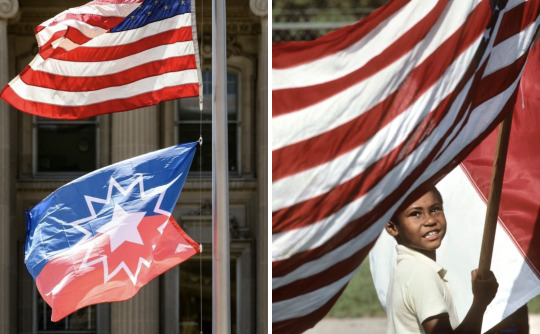


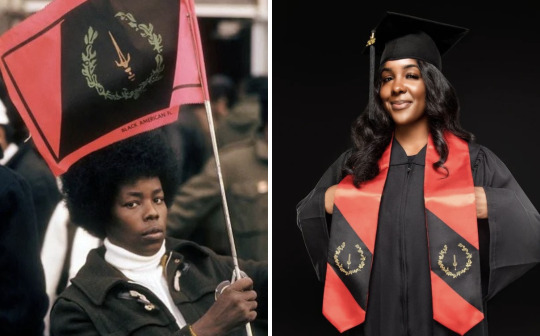
Juneteenth is a Black American holiday.
We call Juneteenth many things: Black Independence Day, Freedom Day, Emancipation Day, Jubilee Day. We celebrate and honor our ancestors.
December 31 is recognized as Watch Night or Freedom’s Eve in Black American churches because it marks the day our enslaved ancestors were awaiting news of their freedom going into 1863. On January 1, 1863, President Lincoln issued the Emancipation Proclamation. But all of the ancestors wouldn’t be freed until June 19, 1865 for those in Galveston, Texas and even January 23, 1866 for those in New Jersey (the last slave state). (It’s also worth noting that our people under the Choctaw and Chickasaw Nations wouldn’t be freed until April 28, 1866 and June 14, 1866 for those under the Cherokee Nation by way of the Treaties.)
Since 1866, Black Americans in Texas have been commemorating the emancipation of our people by way of reading the Emancipation Proclamation and coming together to have parades, free festivities, and later on pageants. Thereafter, it spread to select states as an annual day of commemoration of our people in our homeland.
Here’s a short silent video filmed during the 1925 Juneteenth celebration in Beaumont, Texas:
youtube
(It’s also worth noting that the Mascogos tribe in Coahuila, Mexico celebrate Juneteenth over there as well. Quick history lesson: A total of 305,326 Africans were shipped to the US to be enslaved alongside of American Indians who were already or would become enslaved as prisoners of war, as well as those who stayed behind refusing to leave and walk the Trail of Tears to Oklahoma. In the United States, you were either enslaved under the English territories, the Dutch, the French, the Spanish, or under the Nations of what would called the Five “Civilized” Native American Tribes: Cherokee, Creek (Muscogee), Chickasaw, Choctaw, and Seminoles. Mascogos descend from the Seminoles who escaped slavery during the Seminole Wars, or the Gullah Wars that lasted for more than 100 years if you will, and then settled at El Nacimiento in 1852.)
We largely wave our red, white and blue flags on Juneteenth. These are the only colors that represent Juneteenth. But sometimes you may see others wave our Black American Heritage flag (red, black, and gold).
Juneteenth is a day of respect. It has nothing to do with Africa, diversity, inclusion, immigration, your Pan-African flag, your cashapps, nor your commerce businesses. It is not a day of “what about” isms. It is not a day to tap into your inner colonizer and attempt to wipe out our existence. That is ethnocide and anti-Black American. If you can’t attend a Black American (centered) event that’s filled with education on the day, our music, our food and other centered activities because it’s not centered around yours…that is a you problem. Respect our day for what and whom it stands for in our homeland.
Juneteenth flag creator: “Boston Ben” Haith
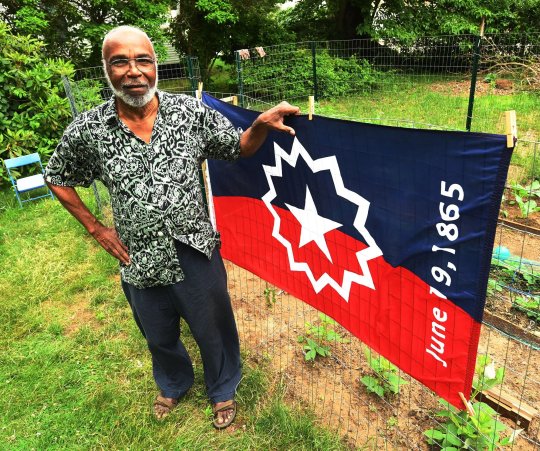
It was created in 1997. The red, white and blue colors represent the American flag. The five-point star represents the Lone State (Texas). The white burst around the star represents a nova, the beginning of a new star. The new beginning for Black Americans.
Black American Heritage Flag creators: Melvin Charles & Gleason T. Jackson

It was created in 1967, our Civil Rights era. The color black represents the ethnic pride for who we are. Red represents the blood shed for freedom, equality, justice and human dignity. Gold fig wreath represents intellect, prosperity, and peace. The sword represents the strength and authority exhibited by a Black culture that made many contributions to the world in mathematics, art, medicine, and physical science, heralding the contributions that Black Americans would make in these and other fields.

SN: While we’re talking about flags, I should note that Grace Wisher, a 13-year-old free Black girl from Baltimore helped stitched the Star Spangled flag, which would inspire the national anthem during her six years of service to Mary Pickersgill. I ain’t even gon hold you. I never looked too far into it, but she prob sewed that whole American flag her damn self. They love lying about history here until you start unearthing them old documents.
In conclusion, Juneteenth is a Black American holiday. Respect us and our ancestors.
#juneteenth#juneteenth flag#black american history#black american culture#ben haith#black american heritage flag#melvin charles#gleason t jackson#grace wisher#american flag#mascogos#juneteenth 2023
1K notes
·
View notes
Text
Herbalism book reccomendations 📚🌿
General herbalism:
The Herbal Medicine-Maker's Handbook by Green J. (2011)
20,000 Secrets of Tea: The Most Effective Ways to Benefit from Nature's Healing Herbs by Zak V. (1999)
The Modern Herbal Dispensatory: A Medicine-Making Guid by Easly T. (2016)
A-Z Guide to Drug-Herb-Vitamin Interactions by Gaby A.R.
American Herbal Products Association's Botanical Safety Handbook (2013)
Medical Herbalism: The Science and Practice of Herbal Medicine by Hoffman D. (2003)
Herbal Medicine for Beginners: Your Guide to Healing Common Ailments with 35 Medicinal Herbs by Swift K & Midura R (2018)
Today's Herbal Health: The Essential Reference Guide by Tenney L. (1983)
Today's Herbal Health for Women: The Modern Woman's Natural Health Guide by Tenney L (1996)
Today's Herbal Health for Children: A Comprehensive Guide to Understanding Nutrition and Herbal Medicine for Children by Tenney L. (1996)
For my black folks!!!
African Medicine: A Complete Guide to Yoruba Healing Science and African Herbal Remedies by Sawandi T.M. (2017)
Handbook of African Medicinal Plants by Iwu M.M. (1993)
Working The Roots: Over 400 Years of Traditional African American Healing by Lee M.E. (2017)
Hoodoo Medicine: Gullah Herbal Remedies by Mitchell F. (2011)
African American Slave Medicine: Herbal and non-Herbal Treatments by Covey H.C. (2008)
The Art & Practice of Spiritual Herbalism: Transform, Heal, and Remember with the Power of Plants and Ancestral Medicine by Rose K.M. (2022)
Indigenous authors & perspectives!!
Braiding Sweetgrass: Indigenous Wisdom, Scientific Knowledge and the Teachings of Plants by Kimmerer R.W. (2015)
Gathering moss by Kimmerer R.W. (2003)
The Plants Have So Much To Give All We Have To Do Is Ask by Siisip Geniusz M. (2005)
Our Knowledge Is Not Primitive: Decolonizing Botanical Anishinaabe Teachings by Djinn Geniusz W. (2009)
Ancient Pathways, Ancestral Knowledge: ethnobotany and ecological wisdom of indigenous peoples of northwestern North America by Turner N. (2014)
A Taste of Heritage: Crow Indian Recipes and Herbal Medicines by Hogan Snell A. (2006)
Medicines to Help Us by Belcourt C. (2007)
After the First Full Moon in April: A Sourcebook of Herbal Medicine from a California Indian Elder by Grant Peters J. (2010)
Latin american herbalism works!!
Earth Medicines: Ancestral Wisdom, Healing Recipes, and Wellness Rituals from a Curandera by Cocotzin Ruiz F. (2021)
Hierbas y plantas curativas by Chiti J.F. (2015)
Del cuerpo a las raíces by San Martín P.P., Cheuquelaf I. & Cerpa C. (2011)
Manual introductorio a la Ginecología Natural by San Martín P.P.
🌿This is what I have for now but I’ll update the post as I find and read new works, so keep coming if you wanna check for updates. Thank you for reading 🌿
#herbalism#herbal medicine#herbal health#green witch#green witchcraft#green magic#herbal magic#herbal witch#herbal witchcraft#plant medicine#plant magic#plant witch#folk healer#healing witch#healing magic#curanderismo#yerbera#curandera#rootwork#rootworker
2K notes
·
View notes
Text




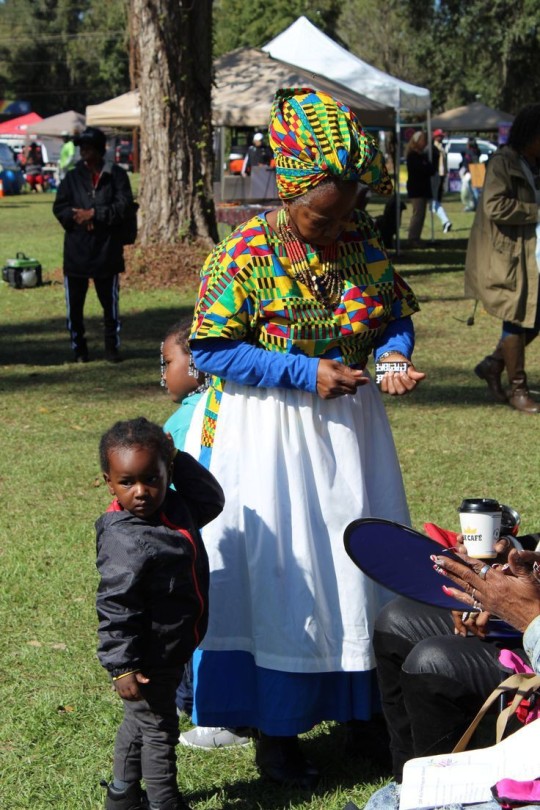
The Gullah Geechee People
It baffles me how few of you know about the Gullah Geechee.
#gullah geechee culture#gullah#gullah geechee#african culture#african american#african american culture#black americans#black culture#black people
12 notes
·
View notes
Text
Reading list for Afro-Herbalism:
A Healing Grove: African Tree Remedies and Rituals for the Body and Spirit by Stephanie Rose Bird
Affrilachia: Poems by Frank X Walker
African American Medicine in Washington, D.C.: Healing the Capital During the Civil War Era by Heather Butts
African American Midwifery in the South: Dialogues of Birth, Race, and Memory by Gertrude Jacinta Fraser
African American Slave Medicine: Herbal and Non-Herbal Treatments by Herbert Covey
African Ethnobotany in the Americas edited by Robert Voeks and John Rashford
Africanisms in the Gullah Dialect by Lorenzo Dow Turner
Africans and Native Americans: The Language of Race and the Evolution of Red-Black Peoples by Jack Forbes
African Medicine: A Complete Guide to Yoruba Healing Science and African Herbal Remedies by Dr. Tariq M. Sawandi, PhD
Afro-Vegan: Farm-Fresh, African, Caribbean, and Southern Flavors Remixed by Bryant Terry
Barracoon: The Story of the Last “Black Cargo” by Zora Neale Hurston
Big Mama’s Back in the Kitchen by Charlene Johnson
Big Mama’s Old Black Pot by Ethel Dixon
Black Belief: Folk Beliefs of Blacks in America and West Africa by Henry H. Mitchell
Black Diamonds, Vol. 1 No. 1 and Vol. 1 Nos. 2–3 edited by Edward J. Cabbell
Black Faces, White Spaces: Reimagining the Relationship of African Americans to the Great Outdoors by Carolyn Finney
Black Food Geographies: Race, Self-Reliance, and Food Access in Washington, D.C. by Ashanté M. Reese
Black Indian Slave Narratives edited by Patrick Minges
Black Magic: Religion and the African American Conjuring Tradition by Yvonne P. Chireau
Black Nature: Four Centuries of African American Nature Poetry edited by Camille T. Dungy
Blacks in Appalachia edited by William Turner and Edward J. Cabbell
Caribbean Vegan: Meat-Free, Egg-Free, Dairy-Free Authentic Island Cuisine for Every Occasion by Taymer Mason
Dreams of Africa in Alabama: The Slave Ship Clotilda and the Story of the Last Africans Brought to America by Sylviane Diouf
Faith, Health, and Healing in African American Life by Emilie Townes and Stephanie Y. Mitchem
Farming While Black: Soul Fire Farm’s Practical Guide to Liberation on the Land by Leah Penniman
Folk Wisdom and Mother Wit: John Lee – An African American Herbal Healer by John Lee and Arvilla Payne-Jackson
Four Seasons of Mojo: An Herbal Guide to Natural Living by Stephanie Rose Bird
Freedom Farmers: Agricultural Resistance and the Black Freedom Movement by Monica White
Fruits of the Harvest: Recipes to Celebrate Kwanzaa and Other Holidays by Eric Copage
George Washington Carver by Tonya Bolden
George Washington Carver: In His Own Words edited by Gary Kremer
God, Dr. Buzzard, and the Bolito Man: A Saltwater Geechee Talks About Life on Sapelo Island, Georgia by Cornelia Bailey
Gone Home: Race and Roots through Appalachia by Karida Brown
Ethno-Botany of the Black Americans by William Ed Grime
Gullah Cuisine: By Land and by Sea by Charlotte Jenkins and William Baldwin
Gullah Culture in America by Emory Shaw Campbell and Wilbur Cross
Gullah/Geechee: Africa’s Seeds in the Winds of the Diaspora-St. Helena’s Serenity by Queen Quet Marquetta Goodwine
High on the Hog: A Culinary Journey from Africa to America by Jessica Harris and Maya Angelou
Homecoming: The Story of African-American Farmers by Charlene Gilbert
Hoodoo Medicine: Gullah Herbal Remedies by Faith Mitchell
Jambalaya: The Natural Woman’s Book of Personal Charms and Practical Rituals by Luisah Teish
Just Medicine: A Cure for Racial Inequality in American Health Care by Dayna Bowen Matthew
Leaves of Green: A Handbook of Herbal Remedies by Maude E. Scott
Like a Weaving: References and Resources on Black Appalachians by Edward J. Cabbell
Listen to Me Good: The Story of an Alabama Midwife by Margaret Charles Smith and Linda Janet Holmes
Making Gullah: A History of Sapelo Islanders, Race, and the American Imagination by Melissa Cooper
Mandy’s Favorite Louisiana Recipes by Natalie V. Scott
Medical Apartheid: The Dark History of Medical Experimentation on Black Americans from Colonial Times to the Present by Harriet Washington
Mojo Workin’: The Old African American Hoodoo System by Katrina Hazzard-Donald
Motherwit: An Alabama Midwife’s Story by Onnie Lee Logan as told to Katherine Clark
My Bag Was Always Packed: The Life and Times of a Virginia Midwife by Claudine Curry Smith and Mildred Hopkins Baker Roberson
My Face Is Black Is True: Callie House and the Struggle for Ex-Slave Reparations by Mary Frances Berry
My Grandmother's Hands: Racialized Trauma and the Pathway to Mending Our Hearts and Bodies by Resmaa Menakem
On Her Own Ground: The Life and Times of Madam C.J. Walker by A'Lelia Bundles
Papa Jim’s Herbal Magic Workbook by Papa Jim
Places for the Spirit: Traditional African American Gardens by Vaughn Sills (Photographer), Hilton Als (Foreword), Lowry Pei (Introduction)
Post Traumatic Slave Syndrome by Dr. Joy DeGruy
Rooted in the Earth: Reclaiming the African American Environmental Heritage by Diane Glave
Rufus Estes’ Good Things to Eat: The First Cookbook by an African-American Chef by Rufus Estes
Secret Doctors: Ethnomedicine of African Americans by Wonda Fontenot
Sex, Sickness, and Slavery: Illness in the Antebellum South by Marli Weiner with Mayzie Hough
Slavery’s Exiles: The Story of the American Maroons by Sylviane Diouf
Soul Food: The Surprising Story of an American Cuisine, One Plate at a Time by Adrian Miller
Spirituality and the Black Helping Tradition in Social Work by Elmer P. Martin Jr. and Joanne Mitchell Martin
Sticks, Stones, Roots & Bones: Hoodoo, Mojo & Conjuring with Herbs by Stephanie Rose Bird
The African-American Heritage Cookbook: Traditional Recipes and Fond Remembrances from Alabama’s Renowned Tuskegee Institute by Carolyn Quick Tillery
The Black Family Reunion Cookbook (Recipes and Food Memories from the National Council of Negro Women) edited by Libby Clark
The Conjure Woman and Other Conjure Tales by Charles Chesnutt
The Home Place: Memoirs of a Colored Man’s Love Affair with Nature by J. Drew Lanham
The Jemima Code: Two Centuries of African American Cookbooks by Toni Tipton-Martin
The President’s Kitchen Cabinet: The Story of the African Americans Who Have Fed Our First Families, from the Washingtons to the Obamas by Adrian Miller
The Taste of Country Cooking: The 30th Anniversary Edition of a Great Classic Southern Cookbook by Edna Lewis
The Tuskegee Syphilis Study: An Insiders’ Account of the Shocking Medical Experiment Conducted by Government Doctors Against African American Men by Fred D. Gray
Trace: Memory, History, Race, and the American Landscape by Lauret E. Savoy
Vegan Soul Kitchen: Fresh, Healthy, and Creative African-American Cuisine by Bryant Terry
Vibration Cooking: Or, The Travel Notes of a Geechee Girl by Vertamae Smart-Grosvenor
Voodoo and Hoodoo: The Craft as Revealed by Traditional Practitioners by Jim Haskins
When Roots Die: Endangered Traditions on the Sea Islands by Patricia Jones-Jackson
Working Conjure: A Guide to Hoodoo Folk Magic by Hoodoo Sen Moise
Working the Roots: Over 400 Years of Traditional African American Healing by Michelle Lee
Wurkn Dem Rootz: Ancestral Hoodoo by Medicine Man
Zora Neale Hurston: Folklore, Memoirs, and Other Writings: Mules and Men, Tell My Horse, Dust Tracks on a Road, Selected Articles by Zora Neale Hurston
The Ways of Herbalism in the African World with Olatokunboh Obasi MSc, RH (webinar via The American Herbalists Guild)
1K notes
·
View notes
Text
Pick-An-Icon: How can you show up for your ancestors during Black History Month?
(Left-to-Right: Pile 1, Pile 2, Pile 3)
In honor of Black History Month, I wanted to start a Pick-A-Card series dedicated to Black Americans. I want to highlight icons in our community while simultaneously offering advice for any Black Americans who seek guidance about how to honor their heritage. If you're a Black American and you're reading this, this is for YOU! With the usage of the special Hoodoo Tarot deck, I will present you with ways to honor your ancestors. If you read this and enjoy and/or resonate with the reading, I encourage you to book with me! Thank you in advance!
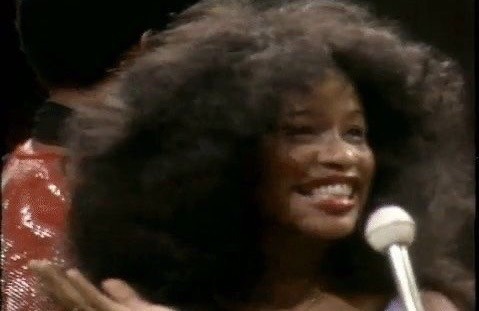
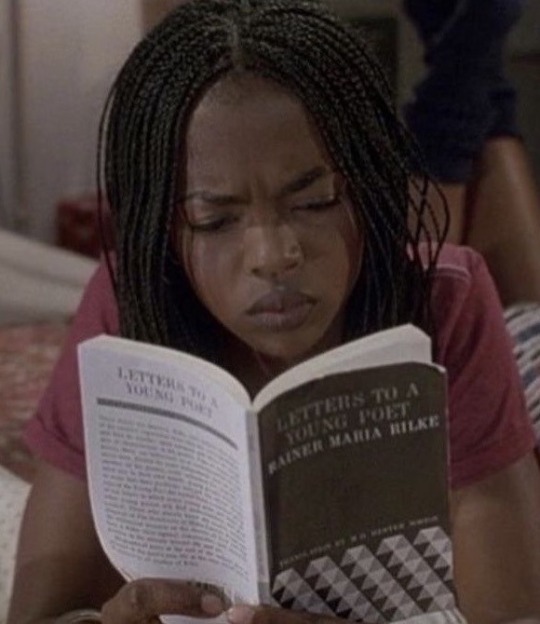
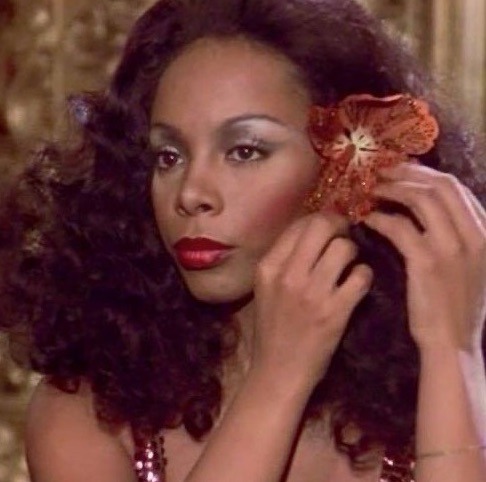
Pile 1: Cards Used - Eight of Knives, Railroad Bill, Three of Baskets, Nine of Baskets, Two of Baskets, Nine of Knives, Gullah Jack and John Horse.
Affirmation: It is easy for me to take control of my narrative.
If you chose the image of Chaka Khan, then you resonate with her feisty, raw energy. This pile is for the creatives who are unsure of their talents. Your ancestors want you to know that there is more than one way to skin a cat. Introduce original ideas to the forefront. One way you can honor them is by not allowing time to limit your abilities. You put in so much work only to feel limited by a man-made construct. It doesn’t matter how old or young you are, you will always have time! Don't let anyone tell you otherwise. I channeled this old interview of Prince saying how he doesn't celebrate birthdays because it keeps him younger. Take on that carefree mindset of not applying the norm to your life. Your time is now! Another way that you can honor your ancestors is by setting up an altar. I get the sense that this pile is very secretive with their spiritual practices. Adorn your altar with foods, drinks, jewelry and other belongings of this loved one. They will appreciate it dearly. If you've lost someone recently, my condolences. But definitely keep in touch with them. I get the feeling that this is a young man, like an older cousin or brother. Keep the memories of you two alive so that he can peacefully cross over into the afterlife. Lastly, being a class act is a great way to honor your ancestors. Refusing to sit back and allow injustices to happen will make your ancestors proud. You have a voice! Use it! Organizing protests, sit-ins, even crowdfunding will make your ancestors proud. Combatting the capitalistic nature of society by collaborating with those in your community will hep you get in touch with your ancestral roots. You're naturally a giver, I can tell.
Pile 2: Cards Used - Nine of Knives, Two of Coins, Five of Sticks, Strength, Daughter of Knives, Aunt Caroline, Ten of Sticks, Six of Knives, The Garden and Seven of Coins.
Affirmation: I deserve to move through life with ease.
Hello, Pile 2. Off rip, I get the feeling that this is my pile of overachievers. I also believe that this is the pile that people who identify as LGBTQIA+. You resonate with the energy of Lauryn Hill's mysterious, intellectual nature. Why do you feel the need to carry so many burdens, Pile 2? One way to honor your ancestors is to lighten your load. They see that you struggle so much because of the amount of responsibilities that you carry. They had to go through similar things and they do want to witness their struggles in your lifetime. Ask for help, please. If you do not ask for help, then you will implode and we want to avoid that as much as possible, yes? You do not have to be the strongest in the room. Who are you trying to prove yourself to? It would be best that this pile talks to a mental health professional to receive guidance and proper medical treatment. Another way that you can honor your ancestors is by blowing off steam. Let your emotions flow. Slam the doors. Scream in pillows. Remove the mask and don't allow your emotions to consume you. You are allowed to be angry, my love. You have a lot to be angry about. Finally, the last way that you can honor your ancestors is to explore. You put in so much work, it's only right you get rewarded for it. Book that spa day. Go get a mani-pedi. Take the weekend off and go into hiding, you deserve it. Go somewhere you haven't been before. Your ancestors want you to relax and wind down.
Pile 3: Cards Used - Ten of Coins, Father Simms, Mother of Knives, Four of Coins, Dr. Grant, Six of Sticks, Six of Baskets, Six of Knives, Nine of Knives, Miss Robinson and Five of Coins.
Affirmation: I am doing perfectly fine in the present moment.
Alright Pile 3. You choose the image of Donna Summer, which means you resonate with her sultry, bold personality. This pile already has a close relationship with their family/ancestors, specifically the maternal side. To honor your ancestors, you must keep it this way. Learn about the traditions of your maternal side. Preserve recipes, photos and jewelry of your maternal side. And most importantly, gatekeep these things! You don’t have to share everything with everyone! Some people who choose this pile will have ties to Houston, Texas or currently live there. If you’re thinking about moving there, you should! It will help you mature. Another way that you can honor your ancestors is to receive compliments of comparison to a family member of yours well. You may not like it, but it shows your ancestors that you have respect for their features and/or personality. If you look like Aunt Linda or Uncle Jermaine, then that’s absolutely fine! Don’t deny it! Embrace it! Lastly, don’t let money consume you! I channeled the scene at the end of Players Club where Diamond visits Ebony at her new job in the shoe store. Diamond tells Ebony to “make that money, girl but don’t let it make you.” You don’t have to keep up with the latest fashion trends. You don’t have to have a job in tech or have a “lazy” desk job. It is perfectly fine to work at McDonald’s or work in retail. You’re making an honest living and that’s all that matters. Accept things as they are. Your ancestors made something out of nothing, and so can you. They are proud of you! Keep going.
#hoodoo#tarot#pick a card#astro notes#tarotreading#law of assumption#neville goddard#manifesting#black history#tarotcommunity#tarot reading#tarot cards#black history month#black tumblr#spirituality#tarot deck#free tarot#pick a pile#pick an image#pac reading
150 notes
·
View notes
Text
fun fact, i live in a swamp.
no, it doesn’t smell bad. when you get to the swampy areas there are cypress trees in the water that put of the smell really good.
the marshes near the salt and brackish water that smell like the pluff mud from which the sweetgrass grows. it smellls like dead sea creatures and works like quick sand and the more tou struggle the more you sink. simply do not walk on it. i have literally never in all my years.
anyway, living in a swamp is cool. there are all sorts of creatures and plants. you can find and hunt for food. i wouldn’t go swimming in it (don’t die from brain eating amoeba or gators pls. take florida level precautions bc it’s not that that different in coastal neigboring states).
we also have lots of swamp themed/related events. my favorite is the hell hole swamp festival, a bomb community event where everyone comes out for essentially a swampy country fair (no rides or funnel cakes but like barbeque and cake and children’s games, and child school choirs, and fun competions. Its also home of the Hell Hole Gator Run, a 10 K. The Hell Hole Talent Show is great too. Just community members of all ages putting on performances and a dinner. If you are from the lowcountry come check it out. we admittedly can be a bit insular, but bring a friend or family and you’ll intergrate right in. express interest in them, their culture, and the geographic area and they will be happy to share.
there are state parks specifically so people can enjoy there time in said swamp. the Santee Canal park has a nature museum that’s pretty cool. you can learn about the ecology of the area and the flora and fauna there in. knowing how to navigate the swamp help the US win the revolutionary war (they didn’t have immunity against malaria and probably got attacked by gators like today’s clueless and or ignorant tourists to the southeast US. like don’t get piss drunk in an area that has deadly wild life and don’t think you’re city smarts apply in nature. they don’t. listen to locals. also don’t screw around with the gators??? we have tourists who pelt them with stones. they are opportunistic hunters who often don’t even mess with you unprompted most of the time. they are important to the enviroment and tourist foolishness can get them put down/ euthanized).
i realize i keep pointing out how deadly it can be, but urban places like NYC, Philly, Los Angelos, and Chicago have their potentially deadly issues, just different ones. still places worth visiting and respecting.
but basically, i live in a swamp and it’s great actually. i often feel like Shrek when people come here to live and disrespect the area. it’s a beautiful place, ecologically important, has events you can’t find in urban areas, people (left and right politically) care about ecological preservation (hunters and fisherman are on board). don’t disrespect the swamp because the swamp WILL disrespect you.
also don’t try to make it new york city or columbus. (becuse its usually and ohian. they are gentrifying the area and promoting “development” that ruins the natural beauty and ecological important cites that the locals take a lot of pride in and are essential to our way of life. literally stay in Ohio if you can’t intergrate into rural/ small towns in southeast states, deadass. i get so angry, no joke. i love my home and my swamp. the state most hated by south carolinians is ohio and there is a reason for that.)
in the words of shrek which often echo in my head:
“what are you doing in MY Swamp?!!!”
i like it here, you should totally visit and drop you preconceptions to best enjoy the experience, and be on your toes and your best behavior if you are an ohian, because most of us already hate all things ohio and will may mess with you if you have an ohio tag on your car and tick them off on the road for diving rudely or insulting said swamp, and our preferred “lack” of development. We feel about it like shrek did tbh. we want to live in south carolina, not ohio /srs.
#ohio#lowcountry#swampcore#swamp#south carolina#southern pride#but not in the white supremacy/confederate sort of way#the thing is most of us (imo) are proud southerners not just the racist people#i am never setting foot in ohio such have the ohians in south carolina have contributedd to my dislike of ohio#please go home#this got of topic but just know south carolinians are thinking it#i am fine with immigration except ohio and people with negative views about the south and southerners#/hj but also /srs#like i am a Black nonbinary Lesbian who is part of a minority ethinic group in the southeast (Gullah Geechee people)#/srs#lol#i don't claim indigeniaity to say our land but arguably could as it is a part of our culture and blood due to the Seminole#we have beef (bc some of the held us Gullah people as slaves) but have also allied in wars against white colonizers#we have also intermixed racially#idk my percentages if any but bc of the slavery thing i likely would not claim it#the main settlement the formed was in florida which half of my family is from#but maybe i should amke amends and take pride in my floridian idenitity lmao#take my rightful place as a proud decendent of florida men and florida women#also learn more about the Seminole and learn about our shared characteristics and history and#have less of a generational chip on my shoulder but idk any#maybe i should make a post#there are so many tags here but they are even less relevant to the post#if you are seminole please dm me bc now i am more curious
1 note
·
View note
Text
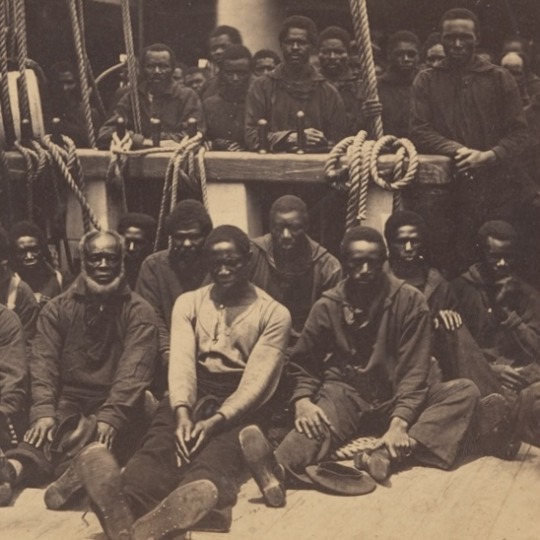
Historians from Southern Illinois University in the Africana Studies Department documented about 20 title words from the Kikongo language are in the Gullah language. These title words indicate continued African traditions in Hoodoo and conjure. The title words are spiritual in meaning. In Central Africa, spiritual priests and spiritual healers are called Nganga.
In the South Carolina Lowcountry among Gullah people a male conjurer is called Nganga. Some Kikongo words have a "N" or "M" in the beginning of the word. However, when Bantu-Kongo people were enslaved in South Carolina the letters N and M were dropped from some of the title names. For example, in Central Africa the word to refer to spiritual mothers is Mama Mbondo. In the South Carolina Lowcountry in African American communities the word for a spiritual mother is Mama Bondo. In addition during slavery, it was documented there was a Kikongo speaking slave community in Charleston, South Carolina
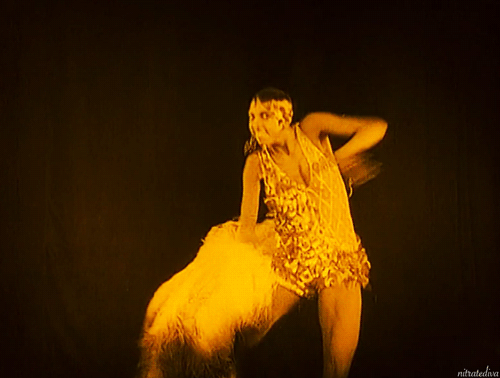
#nganga#mama mbondo#slave community#charlestonch#charleston south carolina#afrakan#kemetic dreams#africans#african#brownskin#brown skin#afrakans#african culture#afrakan spirituality#central africa#kikongo language#gullah#gullah geechee#gullah gullah island
83 notes
·
View notes
Text
What kind of youtube videos should you start watching? PAC
choose the image that feels like the feeling you want to feel when watching youtube
some examples of feelings
>entertained
>enlightened
>relaxed
>seen/felt/heard/connected
topic of images: shows i loved as a kid

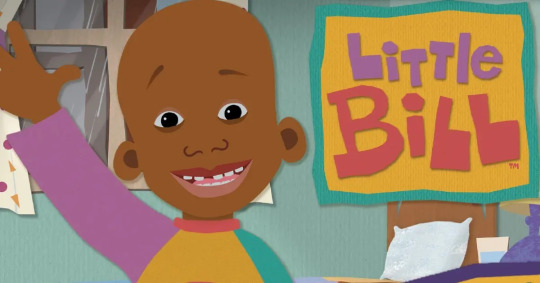
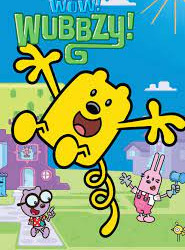

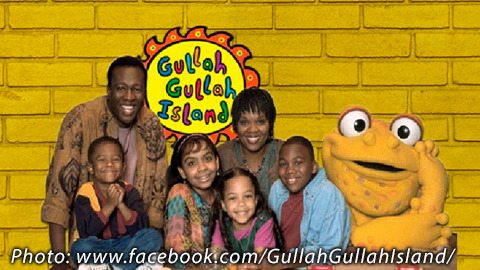

Pile One : Hannah Montana
gaming videos
let go of your high expectations. embrace authenticity and nothingness. you could use a community of different minded people.
some recommendations : sykkuno, quarterjade ,xchocobars disguisedtoast, plumbella, quackity, fuslie
Pile Two: Little Bill
old youtube content
watch an old youtuber you used to love . watch someone who lets you into their life (in their way) Live in a world that doesn't exist anymore so you can really get away. having someone you can look up to would be beneficial.
some recommendations: dan and phil, zoella and alphi, rclbeauty, pat vs. jen, niki and gabi
Pile Three : Wow Wow Wubzy
deep dives
information on random subjects. research your favorite subjects. you are on a steady path in life so what you find interesting will benefit you. Continue to grow by learning from your mistakes.
some recommendations: Kaz Rowe, Ashley Norton, Kurtis Conner, mila tequila, athena p
Pile Four: The Backyardigans
mystery
watch some mysteries and search up your randomest questions. it would be good for you to be exposed to the darker and realer parts of life.
some recommendations: the watcher, missmangobutt, bailey sarian, kendall rae, try guys
Pile Five: Gullah Gullah Island
mukbangs and asmr
be young at heart. connect with someone. make space to relax and love.
some recommendations: latteasmr, stories with kina, lofiluvasmr, sas-asmr, gracev
Pile Six: The Fresh Beat Band
educational
watch content related to the courses you're taking or your job. learn a new skill. get serious about life.
some recommendations: ted talks, news channels, science channels, history channels
#pac#pick a card#pick a reading#pick a photo#pick a picture#pick a pile#pick a crystal#pick a deck#youtube#book reccomendation#it girl#advice#future spouse#dear abby#dear diary#girl blogger#girlblogging#tarot#tarotblr#tarot blog#free tarot#free tarot reading#spiritual community#tarot community
130 notes
·
View notes